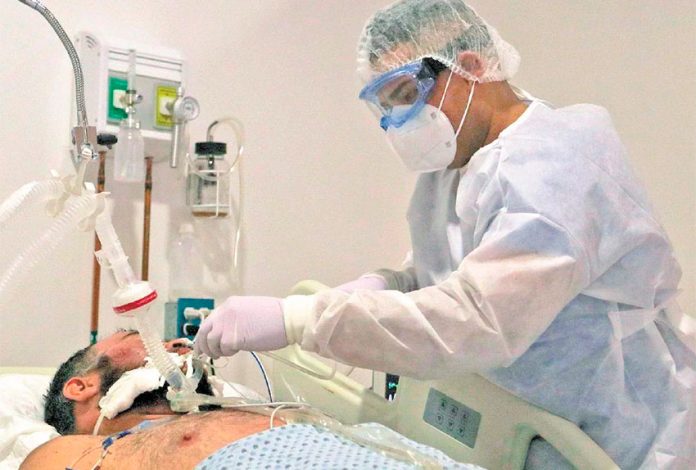As Mexico faces its worst month of the coronavirus pandemic in terms of case numbers and deaths, the national Covid-19 vaccination program will be delayed by work to upgrade the Pfizer factory in Belgium.
The federal government said Monday that a shipment of 219,350 doses of the Pfizer/BioNTech vaccine would arrive in Mexico on Tuesday but no further consignments are expected until February 15. The number of doses scheduled to reach Mexico today is just 50% of what was expected.
The delay, which the United States pharmaceutical company said Friday was a temporary issue as it worked to upgrade its factory in order to boost production, leaves Mexico in a difficult situation as its capacity to administer the second of the two required shots will be limited.
According to data presented by the Health Ministry on Monday night, 485,983 people – mainly frontline health workers – have received a first dose of the Pfizer vaccine but only 6,456 people have received two. The two shots are supposed to be administered 21 days apart but Mexico will not be able to meet that schedule for all those who have already received a first dose.
Nevertheless, Deputy Health Minister Hugo López-Gatell said Monday that a second dose is guaranteed for everyone who has already received one shot. He said the second dose can be administered up to 42 days after the first according to World Health Organization guidelines.
Three experts who spoke to the newspaper El Universal agreed that the delay in the delivery of Pfizer vaccines, of which Mexico has committed to buy 34.4 million doses, is a significant setback.
Alejandro Macías, an infectious disease doctor, a member of the National Autonomous University’s coronavirus commission and the federal government’s point man during the swine flu pandemic in 2009, said the delay will have a substantial negative impact.
He said that vaccinating all health workers against Covid-19 is urgent, adding that the vaccine can bring relief to medical personnel who are fatigued and depressed by the lengthy pandemic. “Unfortunately that [relief] will be delayed,” Macías said.
Indeed, Mexico will have received just over 766,000 doses of the Pfizer vaccine after the arrival of Tuesday’s shipment – enough to inoculate 383,000 healthcare workers. But Mexico has 750,000 such workers, meaning that 1.5 million doses are needed to inoculate all of them with the Pfizer vaccine.
Antonio Lazcano, a biology researcher, said “the delay of the vaccines is terrible news given the demonstrated inability of the Mexican government to control the pandemic in the country.”
Describing the situation as a “bucket of cold water” for Mexico and a “very serious” setback, Lazcano said it was a mistake for the government to base its strategy to combat Covid-19 solely on the administration of vaccines.
![]()
“In recent weeks the health authorities have concentrated their fight against the pandemic on the application of the vaccine [rather than confinement measures]. … It’s clear that they haven’t followed other strategies that are not medical and epidemiological,” he said.
Malaquías López, a public health professor at the National Autonomous University and spokesperson for the university’s Covid-19 commission, not only said the delay is bad news for Mexico but lamented the government’s contradictory statements about its cause.
President López Obrador said Sunday that the United Nations had asked Pfizer to reduce the number of doses it is sending to countries with which it has contracts so it can receive more and distribute them to poor countries. Now the government says the reason is the upgrade at the Pfizer facility in Belgium.
The three experts said the government needs to discuss and decide whether it’s better to use the limited number of Pfizer vaccines it has to inoculate health workers who haven’t received a first shot or use them to administer second doses. (According to Pfizer, its vaccine is about 52% effective in preventing Covid-19 after one dose.)
Confronted with the delay, the government has been at pains to emphasize that Mexico’s vaccination program is not entirely dependent on that vaccine.
President López Obrador said Monday that the government already has or is reaching agreements to purchase doses of Russia’s Sputnik V vaccine, China’s CanSino biologics shot and the AstraZeneca/Oxford University vaccine, which has already been approved by the health regulator Cofepris.
The president said that Cofepris’ approval of the Sputnik vaccine was imminent, asserting that the government has options available to it to ensure that the vaccination plan is fulfilled as promised.
Foreign Affairs Minister Marcelo Ebrard announced Tuesday that 400,000 doses of the two-shot Sputnik vaccine will arrive next week and that 7.4 million doses will come into the country during January, February and March. He also said that 6.95 million doses of the single-shot CanSino vaccine will arrive by the end of March and that 2 million doses of the two-shot AstraZeneca/Oxford University will be available by the last week of that month
Ebrard said the government expects to inoculate almost 14.2 million people by the end of March, a figure that represents about 11% of Mexico’s total population. According to the five-stage national vaccination plan, people aged 80 and over are second in line after health workers followed by those in the 70-79 and 60-69 age brackets.
The urgent need for a wider rollout of Covid-19 vaccines cannot be overstated. The Health Ministry reported 15,441 Covid-9 deaths in the first 18 days of January including 544 on Monday. Mexico’s official death toll currently stands at 141,248, the fourth highest total in the world.
A total of 223,408 new cases was reported in the first 18 days of the year including 8,074 on Monday. The accumulated case tally is just under 1.65 million, the world’s 13th highest total.
Mexico’s Covid-19 death toll and case tally are widely believed to be significant undercounts due to the low testing rate here.
Source: El Financiero (sp), El Universal (sp)
